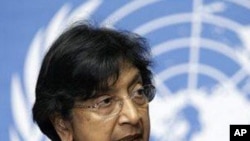The U.N. High Commissioner for Human Rights is welcoming the release of Burma's pro-democracy dissident and Nobel Peace Laureate Aung San Suu Kyi, but says it does not go far enough.
On Monday, Navi Pillay described the Aung San Suu Kyi's release from years of detention as a positive sign that Burma's military rulers are serious about moving along the process of democracy and national reconciliation.
Aung San Suu Kyi is key in the political life of the country, she said, adding that she hoped the world-renowned dissident will be able to play an active role in this process.
Pillay's spokesman, Rupert Colville, tells VOA it is hard to predict what will happen. Everyone, he says, is in a wait-and-see mode, pointing out that there have been many past disappointments.
The pro-democracy leader has been released from house arrest on several occasions, only to be re-arrested again, actions Colville called illegal.
"So, let us hope that is not going to happen. And, I think the outside world is looking very closely, obviously," said Colville. "It appears her release was unconditional, which is very important. But, what is equally important is that the authorities now allow her to play a proper part in the transition that hopefully is under way in Myanmar. So, this could be a very, very welcome first step. But, it is a first step," he said.
The High Commissioner is extremely disappointed that Aung San Suu Kyi was not released before the elections, said Colville. He added she does not want to speculate whether Suu Kyi risks being re-arrested if she tries to pull her pro-democracy party together. The Burmese rulers have banned the party.
But Colville also said High Commissioner Pillay believes Suu Kyi needs to take the helm of her party again, something she has not been able to do for many years.
"I think one other very important part is we should not forget all the other political prisoners in Myanmar," he said. "There are believed to be around 2,200 prisoners, some of whom are from Aung San Suu Kyi's party. Some of them were elected to the Parliament in the 1990 elections. They have been in jail pretty much ever since. So, there are many others who need to come out for the transition process to really get underway. And, for everyone to see that actually there is a very serious process of change underway in Myanmar."
Burma has many human-rights problems, said Colville, including long-standing problems with its ethnic minorities.
The country, he said, is on the U.N. human rights radar screen and will be watched with great interest to see what happens there.
UN Human Rights Chief Welcomes Release of Aung San Suu Kyi




